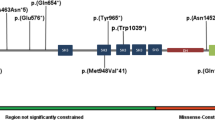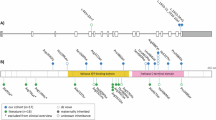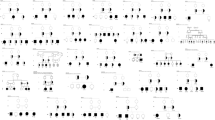Abstract
X-linked intellectual disability (XLID) is a group of neurodevelopmental disorders with genetic heterogeneity. Mutation of USP27X, a deubiquitinase encoding gene, is associated with X-linked intellectual developmental disorder-105 (XLID105), which is characterized by different combinations of impaired intellectual development (ID), developmental delay (DD), autism spectrum, attention deficit hyperactivity disorder and anxiety. Now only fourteen genetically diagnosed individuals have been reported. Here we describe a three-year boy with mild abnormal facial features, DD, severe speech delay and cognitive impairment, and ventricular septal defect. In addition, an increased nuchal translucency was observed during the fetal period. Trio whole-exome sequencing identified a novel missense variant, c.257 C > T (p.Thr86Met), in the USP27X gene (NM_001145073), which is inherited from his healthy mother and assessed to be a variant of uncertain significance. Further in vitro function study shows that this variant is detrimental to the expression and deubiquitination activity of USP27X. Our study provides more pathogenic evidences for this variant identified, and link this variant to the XLID-105 disease. In conclusion, our report expands the clinical and genetic spectrum of USP27X. Clinical trial registration: ChiCTR2000034358.
This is a preview of subscription content, access via your institution
Access options
Subscribe to this journal
Receive 12 print issues and online access
$259.00 per year
only $21.58 per issue
Buy this article
- Purchase on SpringerLink
- Instant access to full article PDF
Prices may be subject to local taxes which are calculated during checkout



Similar content being viewed by others
Data availability
The data underlying this article will be shared on reasonable request to the corresponding author.
References
Maulik PK, Mascarenhas MN, Mathers CD, Dua T, Saxena S. Prevalence of intellectual disability: a meta-analysis of population-based studies. Res Dev Disabil. 2011;32:419–36.
Schalock RL, Luckasson RA, Shogren KA, Borthwick-Duffy S, Bradley V, Buntinx WH, et al. The renaming of mental retardation: understanding the change to the term intellectual disability. Intellect Dev Disabil. 2007;45:116–24.
Vissers LE, Gilissen C, Veltman JA. Genetic studies in intellectual disability and related disorders. Nat Rev Genet. 2016;17:9–18.
Topper S, Ober C, Das S. Exome sequencing and the genetics of intellectual disability. Clin Genet. 2011;80:117–26.
Kasherman MA, Premarathne S, Burne THJ, Wood SA, Piper M. The Ubiquitin system: a regulatory hub for intellectual disability and autism spectrum disorder. Mol Neurobiol. 2020;57:2179–93.
Sadikovic B, Fernandes P, Zhang VW, Ward PA, Miloslavskaya I, Rhead W, et al. Mutation update for UBE3A variants in Angelman syndrome. Hum Mutat. 2014;35:1407–17.
Basel-Vanagaite L, Dallapiccola B, Ramirez-Solis R, Segref A, Thiele H, Edwards A, et al. Deficiency for the ubiquitin ligase UBE3B in a blepharophimosis-ptosis-intellectual-disability syndrome. Am J Hum Genet. 2012;91:998–1010.
Moortgat S, Berland S, Aukrust I, Maystadt I, Baker L, Benoit V, et al. HUWE1 variants cause dominant X-linked intellectual disability: a clinical study of 21 patients. Eur J Hum Genet. 2018;26:64–74.
Tripolszki K, Sasaki E, Hotakainen R. An X-linked syndrome with severe neurodevelopmental delay, hydrocephalus, and early lethality caused by a missense variation in the OTUD5 gene. Clin Genet. 2021;99:303–8.
Fountain MD, Oleson DS, Rech ME, Segebrecht L, Hunter JV, McCarthy JM, et al. Pathogenic variants in USP7 cause a neurodevelopmental disorder with speech delays, altered behavior, and neurologic anomalies. Genet. Med. 2019;21:1797–807.
Homan CC, Kumar R, Nguyen LS, Haan E, Raymond FL, Abidi F, et al. Mutations in USP9X are associated with X-linked intellectual disability and disrupt neuronal cell migration and growth. Am J Hum Genet. 2014;94:470–8.
Dong L, Yu L, Bai C, Liu L, Long H, Shi L, et al. USP27-mediated Cyclin E stabilization drives cell cycle progression and hepatocellular tumorigenesis. Oncogene. 2018;37:2702–13.
Lambies G, Miceli M, Martínez-Guillamon C, Olivera-Salguero R, Peña R, Frías C, et al. TGFβ-Activated USP27X Deubiquitinase regulates cell migration and chemoresistance via stabilization of Snail1. Cancer Res. 2019;79:33–46.
Kobayashi T, Iwamoto Y, Takashima K, Isomura A, Kosodo Y, Kawakami K, et al. Deubiquitinating enzymes regulate Hes1 stability and neuronal differentiation. FEBS J. 2015;282:2411–23.
Tao X, Chu B, Xin D, Li L, Sun Q. USP27X negatively regulates antiviral signaling by deubiquitinating RIG-I. PLoS Pathog. 2020;16:e1008293.
Hu H, Haas SA, Chelly J, Van Esch H, Raynaud M, de Brouwer AP, et al. X-exome sequencing of 405 unresolved families identifies seven novel intellectual disability genes. Mol Psychiatry. 2016;21:133–48.
Koch I, Slovik M, Zhang Y, Liu B, Rennie M, Konz E, et al. USP27X variants underlying X-linked intellectual disability disrupt protein function via distinct mechanisms. Life Sci Alliance. 2024;7:e202302258.
Luo S, Chen L, Wei W, Tan L, Zhang M, Duan Z, et al. Prenatal genetic diagnosis in three fetuses with left heart hypoplasia (LHH) from three unrelated families. Front Cardiovasc Med. 2021;8:631374.
Richards S, Aziz N, Bale S, Bick D, Das S, Gastier-Foster J, et al. Standards and guidelines for the interpretation of sequence variants: a joint consensus recommendation of the American College of Medical Genetics and Genomics and the Association for Molecular Pathology. Genet Med. 2015;17:405–24.
Kearney HM, Thorland EC, Brown KK, Quintero-Rivera F, South ST. American College of Medical Genetics standards and guidelines for interpretation and reporting of postnatal constitutional copy number variants. Genet. Med. 2011;13:680–5.
Quesada V, Díaz-Perales A, Gutiérrez-Fernández A, Garabaya C, Cal S, López-Otín C. Cloning and enzymatic analysis of 22 novel human ubiquitin-specific proteases. Biochem Biophys Res. Commun. 2004;314:54–62.
Alam S, Zunic A, Venkat S, Feigin ME, Atanassov BS. Regulation of Cyclin D1 Degradation by Ubiquitin-Specific Protease 27X Is Critical for cancer cell proliferation and tumor growth. Mol Cancer Res. 2022;20:1751–62.
Jolly LA, Kumar R, Penzes P, Piper M, Gecz J. The DUB Club: deubiquitinating enzymes and neurodevelopmental disorders. Biol Psychiatry. 2022;92:614–25.
Todi SV, Paulson HL. Balancing act: deubiquitinating enzymes in the nervous system. Trends Neurosci. 2011;34:370–82.
Drovandi S, Servetti M, Angeletti A, Puliti A, Ronchetto P, Tassano E, et al. Atypical presentation of Dent disease in a patient with interstitial Xp11.22 deletion. J Nephrol. 2021;34:2111–5.
Acknowledgements
The authors would like to acknowledge the patient and his family for their consent in participating in our study.
Funding
This work was supported by the grants of the Hubei Provincial Natural Science Foundation Project (No.2023AFB893). Construction Project of Clinical Medical Research Center for Neurodevelopment Disorders in Children in Hubei Province (No. HST2020-19). Wuhan Children’s Imaging Clinical Medical Research Center (No. WK2022-38); Wuhan Children’s Neurological Disease Clinical Medical Research Center (No. WK2014-160).
Author information
Authors and Affiliations
Contributions
Sukun Luo, Meng Zhang and Xuelian He designed the research. Yufeng Huang, Li Tan and Hongmin Zhu performed the clinical study. Sukun Luo, Xiankai Zhang and Peiwei Zhao performed expression and function experiments of USP27X variants, and analyzed data with structural modeling. Sukun Luo and Meng Zhang drafted the manuscript. Xuelian He revised the manuscript and approved the final version. All authors reviewed and approved the manuscript.
Corresponding author
Ethics declarations
Competing interests
The authors declare no competing interests.
Ethics approval statement
This study has been approved by the institutional review board of Wuhan Children’s Hospital, Tongji Medical College, Huazhong University of Science & Technology.
Patient consent statement
Written informed consent was obtained from the patients’ parents.
Additional information
Publisher’s note Springer Nature remains neutral with regard to jurisdictional claims in published maps and institutional affiliations.
Rights and permissions
Springer Nature or its licensor (e.g. a society or other partner) holds exclusive rights to this article under a publishing agreement with the author(s) or other rightsholder(s); author self-archiving of the accepted manuscript version of this article is solely governed by the terms of such publishing agreement and applicable law.
About this article
Cite this article
Luo, S., Zhang, M., Zhang, X. et al. A novel USP27X missense variant identified in an individual with intellectual disability. J Hum Genet 70, 489–494 (2025). https://doi.org/10.1038/s10038-025-01359-5
Received:
Revised:
Accepted:
Published:
Issue date:
DOI: https://doi.org/10.1038/s10038-025-01359-5



